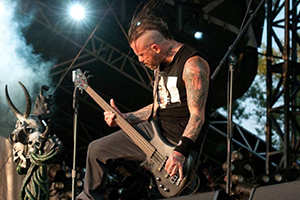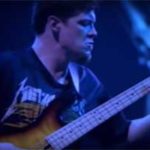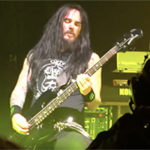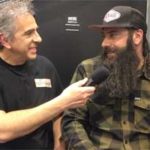Ministry, Stone Sour bassist talks road life, lefty bass technique and paying tribute to Ronnie James Dio
Exclusive interview with FBPO’s Jon Liebman
November 6, 2017
Jason Christopher is known for his work both as a hard-core metal bass player and a “quasi-folk-oriented” acoustic guitar player. He has performed and/or toured with Prong, Stone Sour, Sebastian Bach and, most recently, Ministry, in addition to his own bands, Black President and New Dead Radio. Jason also has a long musical association and close friendship with Corey Taylor (Slipknot, Stone Sour) with whom he recorded “Rainbow In the Dark” on This Is Your Life, a tribute album honoring the late Ronnie James Dio. We caught up with Jason recently to talk about life as a “hired gun” musician and what lies ahead.
FBPO: Let’s start with the early days. Where are you from?
JC: I grew up in Woodstock, NY, between there and Burton County, New Jersey. Woodstock was where I got all my blues, jazz and reggae influences. Oddly enough, my first job, when I was 12 years old, was at this fruit stand down the street from my house in Woodstock, and my boss was Dr. Know from the Bad Brains. He didn’t even need to work. He was just one of those guys that had to always be doing something.
FBPO: How did you get into music?
JC: My mom was in a Crosby, Stills & “Nashette” type of deal when I was very, very young, so I kind of grew up listening to her jam with her friends in the living room. They were always listening to Fleetwood Mac and Black Sabbath and shit like that, so I was immediately interested in classic rock, even though it wasn’t really too “classic” when I was listening to it. MTV started when I was 10. I started watching all the videos and being attracted to that kind of stuff. And then, when the hair metal scene broke out, all the videos had girls in them, and I was going through puberty, and I loved drinking beer and I wanted to get laid, and that’s the only way that I saw that being possible in my area. In New Jersey, especially where I was from in New Jersey, at that time, hair metal was massive because of Bon Jovi and Trixter and all that shit. But I hated hair metal! I loved what came with it, but I couldn’t stand the actual music itself.
FBPO: What attracted you to the bass?
JC: I was lazy! [Laughs] I’m a lazy guy and I just noticed that a lot of the bass players weren’t really doing much and getting to do what everybody else got to do. So I asked my mom for a bass. I wasn’t interested in actually playing anything until I was about 17 or 18. My school had a music class and the teacher brought in keyboards for everybody and asked us to play along to something. And he looked at me and he was like, “Hey, are you a musician?” and I was like, “No,” and he goes, “You should be.” And that was it. I was like, “Okay, so I’ll be a musician.” I asked my mom for a bass that night. She got me one for my 18th birthday, and I’ve been a bass player ever since. She also had her old ’71 Gibson acoustic Hummingbird that she gave me, so that’s where the guitar came in.
FBPO: I noticed you’re a lefty.
JC: I am.
FBPO: Did that make things a little more difficult for you, at least at first?
JC: Before my mother gave me that guitar, I had a lot of musician friends that played guitar. I was broke and couldn’t afford a guitar of my own and they wouldn’t let me switch the strings around, so I had to learn how to play upside down and backwards. That was the only way that I could play.
FBPO: So, you don’t turn the strings around, even to this day?
JC: I play the bass the right way, but I play the guitar upside down and backwards, still, to this day.
FBPO: Why would you switch the strings on a bass, but not on a guitar?
JC: My mom got me a lefty bass, so I just learned how to play lefty bass.
FBPO: Who were your bass influences? Did you have any bass heroes?
JC: Cliff Burton has always been my hero, even though I play nothing like him. I’m nowhere near the talent that he was, but his whole aura, I guess, like his whole thing, from his outfits to the poses in his pictures and his style of playing, the tone that he had, the way he shaped and formed Metallica, from what they were into what they became, just his basic attitude on life… When he died, I was 15. I had never cried over … I mean my grandfather had just passed away of lung cancer and I didn’t cry, but I cried my fucking eyes out when Cliff Burton passed away.
FBPO: Anybody else?
JC: Geezer, of course. Steve Harris. I listened to a lot of Darryl Jenifer, of course, from Bad Brains.
FBPO: I’m getting the picture.
JC: Yeah. Mainly metal, ‘cause I grew up just a close-minded metal-head kid from New Jersey and upstate New York. I didn’t really listen to much else at that time, even though I was raised on a ton of Yes and Zeppelin and all that shit. I wasn’t interested in following John Paul Jones because he played too much, I always thought. I was never into the over-player. That’s what the guitar was always for. I was always into laying back in a pocket with the drummer and kind of staying out of the way.
FBPO: Do you pretty much always play with a pick?
JC: Yeah. Unless, like when I was playing with Sebastian, I would lay back a little bit off the pick, but a lot of the stuff with Prong and Stone Sour and Ministry definitely calls for pick playing, the attack that I get from it. I can play with my fingers, I just choose to play with a pick because of the attack that I get.
FBPO: You can play angry, with a lot of attitude, yet there seems to be a softer side to you too, with acoustic guitar and some of the mellower stuff.
JC: Totally! I could go from Slayer to Mazzy Star in a heartbeat. The shuffle on my phone is ridiculous.
FBPO: Do you have a style you like to play more than anything else?
JC: I love playing acoustic, man! My favorite thing is just like campfire cover shit, which is why me and Corey get along so well. He’s been my best friend for a long time now and that friendship cultivated over that. Just living room jams. Drunk people calling out songs, and if one of us didn’t know it, the other one did. If one didn’t know it, the other could figure it out in a heartbeat. That’s how we were raised, that’s how our friendship had evolved to what it is today.
FBPO: The Ronnie James Dio tribute must have been special.
JC: Of course! One of my first records was Holy Diver, so to be able to play “Rainbow in the Dark” – that was like the best song on the album, I thought, on that covers record, aside from Anthrax’s cover (“Neon Knights”). I just thought that came out fuckin’ so great!
FBPO: What’s keeping you busy these days?
JC: I just left Ministry a couple of weeks ago, so I’m just hangin’ out till somebody else calls me. Whatever happens, happens. My life is pretty insane like that, you know. The hired gun game is pretty crazy.
FBPO: Tell me about your gear.
JC: I just moved to Warwick. I’m working on getting a signature from Warwick right now.
FBPO: Which model are you playing?
JC: I really love the Thumb right now. The 4-string Thumb is my main. I also have a Streamer, as a backup. I went to Warwick and they’re amazing! I mean those guys are just the fucking greatest! And that Thumb. It was like I’d been playing that thing for years.
FBPO: They made a lefty version for you?
JC: Yeah. A lefty version of the Thumb and the Streamer.
FBPO: What about strings?
JC: GHS Bass Boomers. They’re amazing. I mean they’re like fuckin’ killer! And I’m never gonna leave them, because their strings are badass, they last a long time – I’m a very aggressive, sweaty player, so I need strings that are going to last more than a show or two.
FBPO: How about the future? Is there anything else you’d like to do that you haven’t done yet?
JC: I would like to play in a Rihanna-type band and actually get paid $10,000 a week, with a $5,000 retainer when I’m not on the road. That’s like the ultimate hired gun gig. Let me tell you something, Jon. Playing with these guys is great. Sebastian, Ministry, all that stuff is great, but the pay is not that good. I have mouths to feed back home. I mean it’s hard to make a living as a hired gun unless you’re playing in, like, a fucking boy band! It’s nothing against the guys that I play with. They can’t afford to pay. So if you’re not touring nine months out of the year, or doing studio work on records, you’re not getting paid when you’re home. I don’t get paid when I’m home. I have to do other work. It’s brutal.
FBPO: What do you do?
JC: I’m sober a long time, so I do this work called “sober companioning.” I basically babysit drug addicts when I’m not on the road, which is good. It’s a soul-sucking job, but it pays really well.
FBPO: What would you be if you weren’t a bass player – or a guitar player?
JC: Dead. [Laughs] There is no doubt in my mind that music has saved – and ruined – my life at the same time. Without it, I probably would have blown my brains out by now. Honestly, man.





